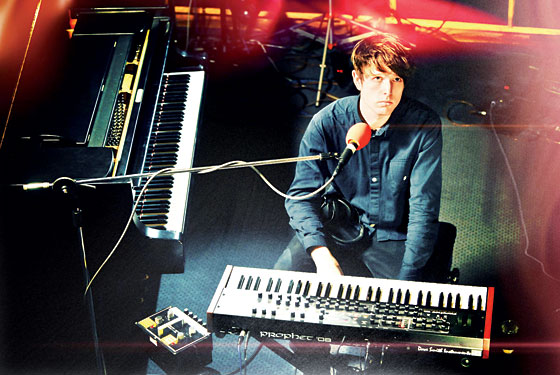
The No. 1 thing separating “electronic music that won’t get played on the radio” from “electronic music that might get played on the radio” is the human voice. It doesn’t much matter what that voice is doing—crooning, rapping, screaming the Gettysburg Address—but an artist who wants to connect with everyday listeners generally needs some kind of vocal performance for people to grab hold of. So when an electronic musician starts singing, it tends to signal a specific kind of ambition.
At least that’s what fans probably suspected last year, when 21-year-old Londoner James Blake—already turning heads (both British and American) with his prickly, haunted-sounding dance tracks, gospel chord changes, and 21st-century wooze—took time out from his music degree to explain himself to journalists. “It’s a strange feeling to have a lot of electronic music out,” he told one, “when all you really want to do is sing.” Sing! By fall, Blake was offering the first taste of his much-anticipated debut album—not another piece of esoteric computer music but a cover of “Limit to Your Love,” by the Canadian singer-songwriter Feist. With Blake sitting at a piano and, yes, singing, in a creakily forlorn English soul voice. The song went into radio rotation; when the BBC ran a poll predicting 2011’s breakout musicians, Blake actually came in second.
That’s a surprising amount of excitement for music this … sculptural. As it happens, that Feist cover is plenty esoteric itself: It’s full of dead air, and Blake skulks around a handful of phrases. At points, his piano disappears entirely, replaced with giant, concussive rumblings of bass. His self-titled album, out now on iTunes from Universal Republic, features even starker, less traditional ideas about song form, down to a two-song suite that’s mostly just electronically processed harmonies. “The Wilhelm Scream” starts with sleepy R&B, then gradually pumps its empty space full of steam and reverb, as if the song were being pulled away into a dense fog. “I Never Learnt to Share” repeats a single mournful phrase (“My brother and my sister don’t speak to me / And I don’t blame them”), then gradually mounts toward another of those tectonic bass incidents. This is a record with very few sounds per square inch, and most of what’s there is slow, lonesome, and rimed with digital rust. If there’s anything from the world of electronic music that Blake’s holding to, it’s the idea that a song can be a physical event—a sonic process, like watching a flower bloom or a volcano erupt—and not just a person performing.
All of which is to say, Man alive, does he mess with the idea that vocals must lead one closer to traditional pop. Some of Blake’s singing is human and familiar, sure—but just as much of it is basically figurative. One of his best tracks from last year, “CMYK,” took snippets of voices from R&B songs and sent them clattering around empty-warehouse beats like dice in a cup; the best parts of this album do the same thing, only with the proportions reversed. It’s striking that there’s no ready-made image to describe that—not unless you can imagine little bits of warehouse clattering around inside a guy’s voice.
It probably helps Blake’s case, commercially speaking, that a bunch of U.K. trends have set the scene for this stuff to sound vital. The strain of dance music Blake’s drifting from is dubstep, a decade-old London style whose sound—cavernous and jittery, with bass that’s less a series of notes and more of a seismic wobble—is steadily filtering into mainstream places. (Even Britney Spears’s new single borrows from it, never mind great British hits like Katy B’s “Katy on a Mission” and Jamie Woon’s “Night Air.”) And the success of another young English act called the xx has done a lot for the crossover appeal of spare, meditative music. (This LP is the kind of thing one listens to alone—or, if with others, not so much while talking.) Blake might make “difficult” music, but he’s sitting right at the corners of sounds and ideas people are interested in.
I doubt that’s calculated. This record might front the conventional appeal of a singer and a songwriter, but what Blake’s doing with those notions is abstract and rootless and as oddly immersive as the music he was making before. (It’s a natural development for a guy who once sang in a gospel choir—and, to hear him tell it, spent the whole time distracted by the pianist’s chord choices.) I don’t know whether to feel bad or happy for anyone who gets lured in by that voice and winds up someplace so barren and new.